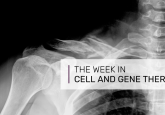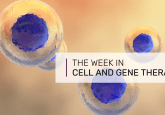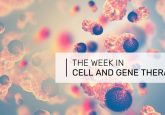Cell therapy weekly: Using maggot enzymes to heal chronic venous leg ulcers

This week: Precision BioSciences (NC, USA) and iECURE’s (PA, USA) gene-editing therapy approved for clinical trial, positive Phase I results for Obsidian Therapeutics’ (MA, USA) novel cancer cell therapy and positive Phase I/II results for SolasCure (Cambridge, UK) wound healing gel.
The news highlights:
- Precision BioSciences and iECURE’s in vivo gene-editing therapy approved for Phase I/II trial
- Positive Phase I clinical trial topline results of Obsidian Therapeutics cancer cell therapy candidate
- Wound gel containing maggot-derived enzyme demonstrates adequate safety profile in Phase II clinical trial
Precision BioSciences and iECURE’s in vivo gene-editing therapy approved for Phase I/II trials
The Australian Therapeutic Goods Administration has approved the first-in-human Phase I/II trial for ECUR-506. This therapeutic, developed by Precision BioSciences and iECURE, is an in vivo gene-editing therapy for the treatment of Ornithine Transcarbamylase (OTC) deficiency in pediatric and neonatal patients. OTC deficiency is a metabolic disorder caused by a genetic defect in a liver enzyme responsible for ammonia detoxification.
“For too long, families managing a child with severe OTC deficiency have had no choice other than liver transplant, which carries significant risks including life-long immunosuppression caused by medicines needed to prevent organ rejection,” said George Diaz, Vice President and Therapeutic Area Lead for Urea Cycle Disorders at iECURE. “If ECUR-506 lives up to its potential of permanently enabling these children to create healthy OTC enzyme, it could enable them to avoid significant future nervous system and liver damage that high ammonia levels cause or the need for liver transplants.”
Positive Phase I clinical trial topline results of Obsidian Therapeutics cancer cell therapy candidate
Obsidian Therapeutics’ new cancer cell therapy candidate has achieved positive safety and efficacy data. The interleukin-2-sparing tumor-infiltrating lymphocyte (TIL) cell therapy, OBX-115, was administered to patients with advanced or metastatic melanoma who had already undergone immune checkpoint inhibitor immunotherapy.
“The OBX-115 data show its potential to be a meaningful advancement in the treatment of metastatic melanoma and TIL cell therapy,” said Parameswaran Hari, M.D., M.S., Chief Development Officer of Obsidian Therapeutics. “These initial topline results support the promise for OBX-115 to drive responses in this heavily pre-treated patient population and facilitate the expansion of TIL cell therapy in melanoma to a broad group of patients without the need for [Interleukin 2].”
Wound gel containing maggot-derived enzyme demonstrates adequate safety profile in Phase II clinical trial
SolasCure’s Aurase Wound Gel is a hydrogel that contains a recombinant enzyme derived from medical maggots. The gel aims to accelerate wound debridement and contribute to wound bed preparation and healing. The Phase IIa trial results demonstrate a strong safety profile for patients with chronic venous leg ulcers. Higher concentrations of the enzyme will be trialed in additional Phase II trials.
Andy Weymann, the Chairman of the SolasCure Board, commented, “The positive safety and proof-of-concept data from the Phase IIa trial represents a huge milestone for the company, accelerating its mission to provide a disruptive wound care product that could significantly improve outcomes for patients with chronic wounds globally. I look forward to working alongside the team as we now focus on developing the efficacy of Aurase Wound Gel in subsequent Phase II trials.”
You might also like:
 CAR-T cell therapy platform targets childhood CNS cancers
CAR-T cell therapy platform targets childhood CNS cancers
Seattle Children’s Hospital launched BrainChild Bio, FUJIFILM Corporation expanded its cell therapy production capabilities, and Eligo Bioscience secured US$30 million in a Series B funding round.





